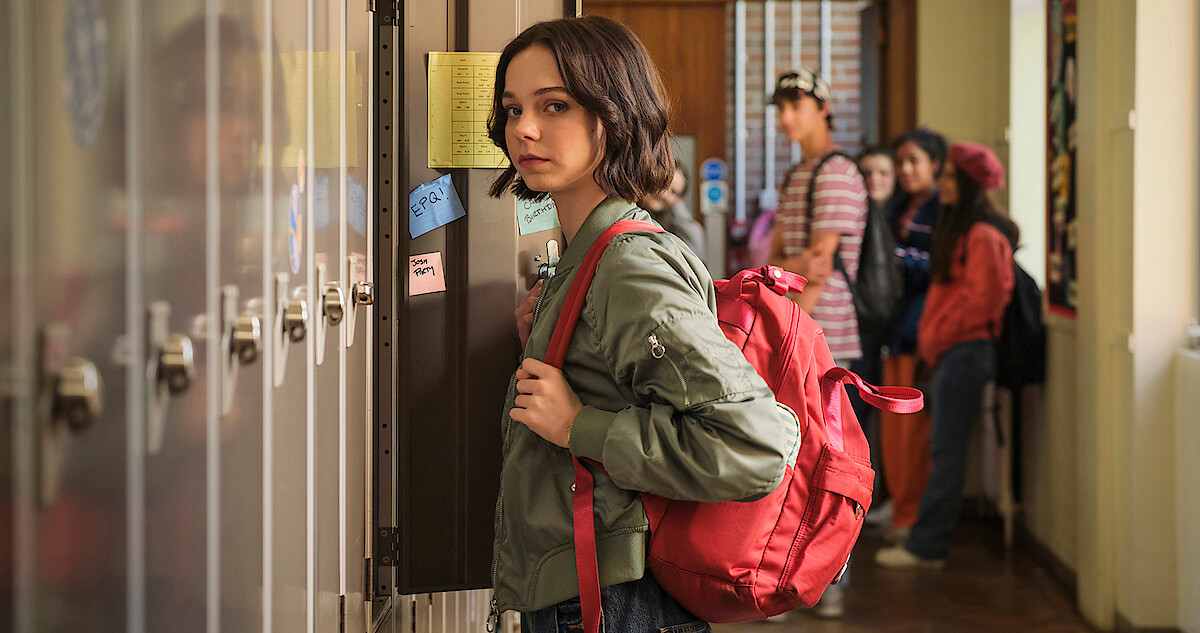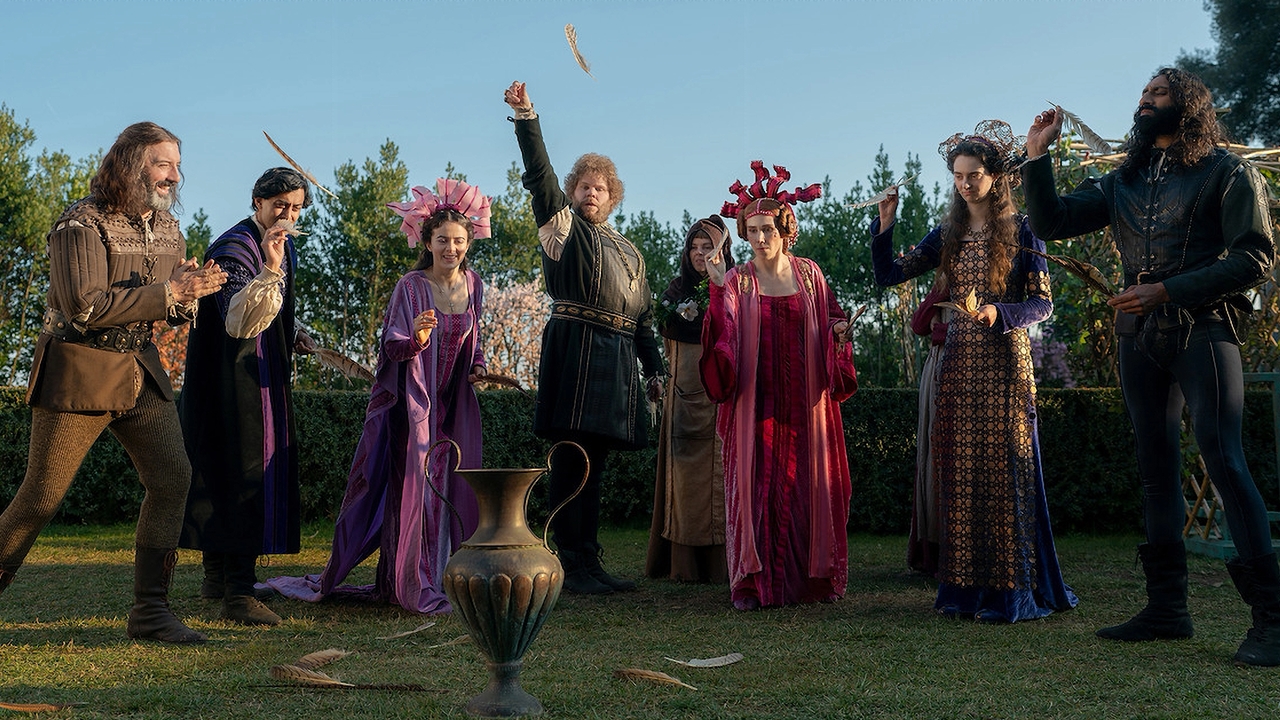5 Best Releases Like Wayward Pines on Netflix

A Good Girl's Guide to Murder
Ever since the pseudonymous Carolyn Keene first created the plucky heroine Nancy Drew in 1930, so-called Girl Detectives have remained an object of cultural fascination. Netflix’s riveting new series A Good Girl’s Guide to Murder introduces audiences to Pip Fitz-Amobi (Emma Myers, the breakout of Tim Burton’s Wednesday), a worthy successor to Nancy and her compatriots like Harriet the Spy. In just six tightly-written episodes, Good Girl’s Guide unspools a satisfying small town mystery that will captivate teenage fans and adult viewers alike. Eschewing her original thesis proposal on feminism in Gothic literature, self-possessed seventeen-year-old Pip decides to spend her final year of school before university investigating the mysterious disappearance of her older classmate Andie Bell (India Lillie-Davies). Andie’s boyfriend Sal (Rahul Patni) supposedly confessed to her murder before taking his own life, but Pip has her doubts from the jump, and not without reason: she may have been the last person to see the doomed couple together. Her fledgling case grows even more complicated when she connects with Sal’s charming younger brother, Ravi (Zain Iqbal), and finds herself developing romantic feelings for the first time in her life. Myers confidently anchors the fun, diverse ensemble of newcomers with spunk and aplomb, her wide blue eyes searching every scene for clues. Iqbal and Patni are perfectly cast as crush-worthy sadboys, while Asha Banks and Yasmin Al-Khudhairi (Rye Lane) stand out as Pip’s practical best friend Cara Ward and her troubled older sister, Naomi. Familiar British favorites like Anna Maxwell Martin (Becoming Jane, A Personal History of David Copperfield) and Mathew Baynton (Wonka) round out the adult side of the cast, playing Pip’s loving mother and kindly English teacher, respectively. Continue Reading →

The Decameron
To say creator Kathleen Jordan’s adaptation of The Decameron is loose is to enjoy the gift of significant understatement. The source material, an Italian collection of 100 tales “told” to one another by ten characters, was a kind of Canterbury Tales for the plague set. Or, more accurately, Tales was a Decameron for the Brits. The Italian work, after all, has about 50 years on Chaucer’s book. While the TV series does gather ten characters together, initially to celebrate the arranged wedding of Pampinea (Zosia Mamet) and Leonardo (Davy Eduard King), then to try to ride out the Bubonic, it largely ditches the tale-telling. In its place is a satirical take on today’s class inequalities smuggled onto screen under the veil of a period black comedy. While likely conceived of during or in the wake of COVID’s darkest early days, the tones and themes update nicely to now. It does not reflect our modern situation as literally as it did in, say, April 2020. Nonetheless, it smartly captures how certain global tragedies cannot be dodged and how the rich and powerful will still try at the cost of the larger society. If only it landed its jokes as well. Zosia Mamet and Saoirse-Monica Jackson learn the importance of decanting from Jessica Plummer. (Giulia Parmigiani/Netflix) It isn’t for lack of talent. Tanya Reynolds—so good in Sex Education—proves she deserves a bigger stage, stepping into one of the lead roles as the handmaiden Licisca. She finds herself tethered to the vain and selfish Filomena (Jessica Plummer) as they journey to Leonardo’s estate. How the kind and socially conscious member of the servant class evolves in isolation as she tastes luxury and power for the first time is genuinely interesting and well-acted by Reynolds. A scene where she goes from faking kindness to the hypochondriac aristocrat Tindaro (Douggie McMeekin) to genuinely delight with him feels wonderfully organic and honest. Continue Reading →
RIPLEY
Tom Ripley doesn't exist. Not just in the sense that he's a fictional creation of thriller novelist extraordinaire Patricia Highsmith, no; as a man, Ripley is a chimera, a shadow, a formless void that hungrily sucks in whatever nourishment it can from whatever or whoever is around him. Damn the consequences. He's one of literature's (and, in the case of several cinematic adaptations, moviedom's) greatest conmen, a remora with nothing behind the eyes except the next game, the next mark, the next place to flee when suspicions run too high. Now, writer/director/showrunner Steven Zaillian has adapted the first of Highsmith's novels into an eight-episode miniseries for Netflix (it was originally slated for Showtime before they sold it), and by virtue of those pedigrees, it's maybe the best original series the streamer has put out all year. When we first meet Tom Ripley (Andrew Scott), he's a low-level grifter eking out a living with some street-level mail fraud in New York City. But one day, a private dick (Bokeem Woodbine) taps him on the shoulder and hauls him in front of a wealthy shipping magnate (filmmaker Kenneth Lonergan) for a special mission: travel to Italy on his dime to find his layabout painter-wannabe son Dickie Greenleaf (Johnny Flynn) and bring him back home to fulfill his business responsibilities. Ripley doesn't know the man, but he agrees -- the chance to start all over somewhere else (and be bankrolled for it) is too great. So he swans off to Atrani, a small beachside villa where he ingratiates himself to the pampered Dickie and his writer girlfriend, Marge (Dakota Fanning), two people as insulated by their wealth as they are by their respective artistic mediocrities. RIPLEY. (L to R) Dakota Fanning as Marge Sherwood and Johnny Flynn as Dickie Greenleaf in RIPLEY. Cr. Courtesy of Netflix © 2024 Unlike previous adaptations of the material, Zaillian barely (if ever) clues us into any kind of deeper humanity lurking under the surface for Tom Ripley. Matt Damon's version from The Talented Mr. Ripley was motivated by emotional impulse; here, Scott plays him like a reptile. There's something downright alien about his cold tilt of the head, those shark-like eyes (aided by Robert Elswit's chiaroscuro photography, which we'll get to later), the way his delivery teeters between blase deference and a flat, manipulative affect. He seems less like a desperate hanger-on than a predator, one all too happy to take rich people for everything they've got and discard them when he's sucked all the meat off their bones. He doesn't covet the lifestyles of the rich and famous, and even the script's frequent allusions to Ripley's subtextual lust for Dickie don't seem to fully account for his motivations. Continue Reading →
All the Light We Cannot See
Early in For All Mankind Season 4, Ed Baldwin (Joel Kinnaman) and Dani Poole (Krys Marshall) reencounter each other for the first time in years on the Happy Valley Mars base. Smiling warmly, each says, “Hi, Bob,” to each other. For fans of the show, it has an immediate impact. The significance of the silly greeting reminds those audience members of the deep bond between these two astronauts. Newcomers likely won’t grasp the specifics of the importance, but Marshall and Kinnaman’s performances make it quite clear that it isn’t some random bit of silliness. Continue Reading →
